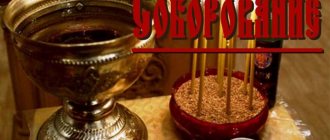Now, at the beginning of Great Lent, many church people begin one of the seven sacraments of the Church - the sacrament of the Blessing of Anointing, or Unction. However, the sacrament of Unction is not very well known to a wide circle of people. That is why the strangest prejudices and misconceptions are associated with it. Sometimes it is believed that only the hopelessly sick need to be given unction, that after Unction a person either certainly dies or is certainly healed... What does the Church actually understand by this sacrament? Archpriest Valentin ASMUS tells
What is the price? Or how much should I give the priest for confession, communion and unction?
The question is common, but not entirely correct. Everyone has their own possibilities, and they usually proceed from the possibilities during sanctification, avoiding extremes. Ask the priest who performed the unction. If he answers “how much will you give,” then you can ask for guidance, saying, “how much do they usually give?” and the priest can give you direction of thoughts.
The question is posed completely incorrectly - we’ll give as much as we don’t mind, this formulation is incorrect. Another thing is that if there is no opportunity, it happens, and there are no questions at all, the priest will do everything that is required of him without any problems and will not take money. The priest visits barracks and very nice apartments, because people are people everywhere, and that’s life.
It is good and right when people treat with respect, understanding that such a sacrifice is a sacrifice and it comes from the heart, and the Lord will reward everything a hundredfold.
Unction: two options, one essence
Photo by Yulia Makoveychuk
The Sacrament of Unction has two options for its celebration. Sometimes it is performed at home on one sick person, and sometimes in church, on everyone who wants to begin this sacrament and who can come to church for health reasons. In this case, it is usually timed to coincide with some special events of the church year. In the Russian Orthodox Church, this is most often the period of Great Lent, less often - Christmas.
Should you take unction often? As a rule, the sacrament of Unction is resorted to once a year, but, of course, the person himself must come to the realization that he needs healing. Not only in physical healing (even a physically healthy person can undergo unction), but above all in spiritual healing, he needs cleansing of his unconscious sins.
I would like to note that after a person has received unction in church, it is highly advisable for him to confess and partake of the Holy Mysteries of Christ as soon as possible.
How does this sacrament happen? According to the rite, it should be performed by seven priests, although in reality there may be fewer priests - it is not always possible to gather so many even in the capital’s churches. But even with a smaller number of priests (even with just one), the sacrament will still be valid.
Photo by Yulia Makoveychuk
The modern rite of Unction is lengthy and complex. First, preparatory prayers and the canon are read, and then the rite itself is performed. Excerpts from the Apostolic Epistles included in the New Testament and from the Gospel are read, then a litany (a prayerful appeal to God pronounced by the deacon on behalf of those praying) is read, remembering the names of those who receive the sacrament. Then a prayer is read for the consecration of the oil and the anointing itself is performed. During anointing, the priest reads the already mentioned prayer “Holy Father, physician of souls and bodies...”. Then the second priest begins to participate in the sacrament, and again a similar cycle follows. This is repeated seven times. At the end of the rite, the Gospel is placed on the heads of those who have begun the sacrament with the reading of a special final prayer. After the service, believers can take home the oil left after the sacrament and use it for anointing. The same oil is also used at the burial of a Christian - it is poured into the coffin before closing the lid. So this sacrament reminds us of eternal life and prepares us for it.
Interesting remarks that few people talk about
The priest often confesses to people in hospitals in various states, and the Lord expects repentance and change from all of them. It is important here that the priest makes attempts to explain to the person the need for sincere repentance and the meaning of the sacraments. And if a person’s heart softens and he repents sincerely and in detail, then extraordinary Divine joy and resolution of the situation await him.
But if everything goes off formally or without proper repentance, then, as a rule, there will be some relief, but completely temporary - for a day, two, three, and so on.
I have seen many people who have been sick for years, many are in a 50/50 situation, for some the doctors have already told how much is left, and a painful death awaits them, but in reality everything happens in a special way, according to God’s will, only you need to allow God to come to you, and not move away from it.
So, you come to confess, take communion, but the person does not really repent, and does not understand his sins, in practice, it becomes easier for a couple of days, those who have not slept begin to sleep, those who suffer severe pain are consoled, those who are tired become relieved, some even begins to walk temporarily. But in fact, he will continue to suffer until he atones for his sins with bodily suffering and until a person develops humility. There are many such cases, and the priest actually sees it all: the attitude and everything else.
PORTAL CONTACTS
The clergy of the Saratov diocese answer questions about the Sacrament of Unction.
Why is unction called a sacrament?
Why is it being done? Archpriest Anatoly Strakhov, rector of St. Nicholas Church at the Elshansky cemetery in Saratov, answers:
— The Sacrament of Anointing, or, as it is also called, the Sacrament of Unction, is performed in our churches during fasting, but can be performed on any day of the church year, if there is a need for it.
Blessing of oil is a sacrament, in it forgiveness of human sins is asked and the grace of God is given, healing mental and physical infirmities.
During the unction, apostolic and gospel readings are performed seven times, certain prayers are read, and the Christian is anointed seven times with consecrated oil mixed with red wine. The word “oil” translated from Greek means “mercy.” Anointing with oil symbolizes a person’s communion with the ineffable mercy of God. God Himself, accepting repentance, raises a person from his sick bed.
Like all the sacraments of the Orthodox Church, the Sacrament of Anointing was founded by the Lord Jesus Christ Himself. In the Gospel of Mark there is a story that the holy apostles, sent by the Savior into the world, preached repentance, cast out many demons and anointed and healed many sick people (Mark 6 :12-13). Healing was performed by the apostles through anointing with oil because it was not they who healed people personally, but the merciful Lord who accepted a person’s repentance.
It is important to remember that a Christian strives to heal his soul and body in order to serve God and his neighbors. Unfortunately, some people perceive unction as an opportunity to get rid of bodily infirmity so that it does not interfere with their enjoyment of life. This attitude towards the sacrament is blasphemous. If a person does not bring sincere repentance to God, does not make efforts to renounce sin, he will not become a participant in the Divine grace that heals us.
Is the Sacrament of Unction intended only for the sick? If a person does not feel any physical ailments, is it possible and necessary for him to undergo unction?
Priest Yaroslav Kozdrin, rector of the Church of the Holy Blessed Prince Alexander Nevsky, Saratov, answers:
“We are designed in such a way that it is the illness of the body that becomes a powerful incentive to change something in our lives. To overcome the disease, a person is ready to part with old, often sinful, habits. As they say, “the most important thing is health,” but is this the only slogan that should encourage us to participate in the Sacrament of Anointing? We can say that first of all people who are sick are blessed to receive unction - the very content of the prayers following the sacrament testifies to this. However, the purpose of unction is by no means a “pronounced healing effect.” We pray for the sick with these words: “Rise him up from the bed of pain and from the bed of bitterness, whole and perfect.” It is unlikely that we will find the word “recovery” anywhere in liturgical texts - overcoming a painful state is called “healing” in them, and the word “whole” itself becomes synonymous with the word “healthy.” The return of such a holistic state is possible only through deliverance from sin, overcoming what alienates a person from God, therefore the leitmotif of this church service is not a request for health, but a request for the forgiveness of sins of a Christian who resorts to the Sacrament of Anointing. The final prayer of unction, “To the Holy King,” during which the priests hold the open Gospel over the heads of the worshipers, contains only petitions for the forgiveness of sins, without mention of bodily infirmities. It is worth paying attention to the content of passages from the Gospel that are read during the Sacrament of Anointing. Along with the readings about the healing of the mother-in-law of the Apostle Peter and the daughter of the Canaanite wife, about the Savior’s command to the apostles to go and heal ailments in people, we hear the Gospel story about the conversion of the tax collectors Zacchaeus and Matthew and the parable of the ten virgins - a reminder that we need to be ready to meet Christ at every moment of your life. Therefore, even those who are exhausted in the war with their sins and passions can begin the Sacrament of Anointing, even if they are physically healthy.
Is it possible to receive remission of sins in the Sacrament of Unction without resorting to confession?
Answers priest Alexy Strizhov, full-time cleric of the Church of the Nativity of Christ in Volsk:
— The Sacrament of Anointing was established for the healing of a person and the forgiveness of sins. Through sin, death and corruption entered the world; sin is inextricably linked with illness, manifesting its destructive power both in the body and in the soul of a person. In the prayers of the rite of unction, petitions are often heard for the forgiveness of the sick person’s sins, for deliverance from passions and all evil. The Church believes that during unction, forgotten and unconscious sins are forgiven. However, in no case should we think that unction automatically frees us from all sins and that the meaning of the Sacrament of Confession is therefore abolished. On the contrary, the Church strongly recommends resorting to confession before performing the Sacrament of Anointing, which presupposes the repentance of the patient and a sincere desire for physical, mental and spiritual health - deliverance not only from the consequences, but also from sin itself. The sacraments of Unction and Confession complement each other.
Is it possible for people who do not live church life to receive unction?
Answers priest Andrei Solodko, rector of the Church of the New Martyrs and Confessors of Saratov, Saratov:
— The purpose of the Sacrament of Unction is stated in the message of the holy Apostle James: Is any of you sick, let him call the elders of the Church, and let them pray over him, anointing him with oil in the name of the Lord. And the prayer of faith will heal the sick person, and the Lord will raise him up; and if he has committed sins, they will forgive him. Confess your faults to one another and pray for one another in order to be healed: the fervent prayer of a righteous man avails much (James 5 :14-16). From these words it is clear that important components of the effectiveness of this sacrament are faith, prayer and repentance of the sick person himself. It is possible for people who do not lead a full church life to receive unction, but this presupposes a subsequent change in the person’s life and churching.
How often can you resort to unction?
Answers priest Alexy Strizhov, full-time cleric of the Church of the Nativity of Christ in Volsk:
— In the tradition of the Church, the Sacrament of the general Blessing of Anointing in churches is celebrated during Great Lent. Previously, in the churches of the Russian Church this took place on Maundy Thursday, and already in the second half of the 20th century, the custom of performing unction on other weeks of Great Lent or on the days of strict fasting before the Feast of the Nativity was established. It is good to keep this tradition and begin the sacrament every year during the Holy Pentecost, when we try to prepare ourselves for Easter through feats of abstinence and repentance. I had to deal with such an absurd misconception that the sacrament has its power, “is valid” for one year, after which it is necessary to “renew”, “extend” the validity of the unction. Of course, it is wrong to think so - one cannot limit the grace of God to a time frame or perceive it solely as some kind of impersonal mechanism. The Sacrament of Anointing must be resorted to at any time of the year in case of serious illness, when a person is most in need of God's effective help. In this case, you can ask the priest to perform the sacrament at home at the patient’s bedside or in a hospital ward.
Is it possible to administer unction to an unconscious patient?
Answers priest Alexy Strizhov, full-time cleric of the Church of the Nativity of Christ in Volsk:
“Sometimes they actually ask to administer unction to a person who is either unconscious or in a state where the patient no longer perceives the surrounding reality well. Here, several factors influence the decision to perform the sacrament. Strictly speaking, church sacraments are not performed on a person in an unconscious state. However, in practice, many priests do not refuse to perform the Sacrament of Anointing if a person lived a church life before illness, regularly confessed and received communion. After all, if a sick person were able to express his will, he would certainly want to receive grace from God through the Sacrament of Unction. And this grace acts not only on the sick person’s body, since a person is not only made up of a material body, but on his entire being. It is worth noting that there is no universal approach here, and each case should be considered with a priest.
What to do with the blessed oil and candles that remain after the unction?
Archpriest Alexander Domrachev, rector of the Church of St. Tikhon, Bishop of Voronezh, Zadonsk Wonderworker, Saratov, answers:
— Many believers who participated in the Sacrament of Unction bring home candles and oil from the church that were used in the sacrament. Candles, as expected, are lit in front of the icons during prayer. The oil can be consumed with reverence, along with prosphora and holy water. Or you can anoint yourself with it: usually the forehead is anointed with a cross or the oil is applied to sore spots. But it is worth remembering that this “home” anointing of ours is in no way the Sacrament of Unction or its continuation. The sacrament is performed precisely during the ceremony in the temple. The use of oil and candles left after the Blessing of Anointing, privately, is only a pious tradition.
Photo by Georgy Dzhmil
Newspaper “Orthodox Faith” No. 06 (626)










